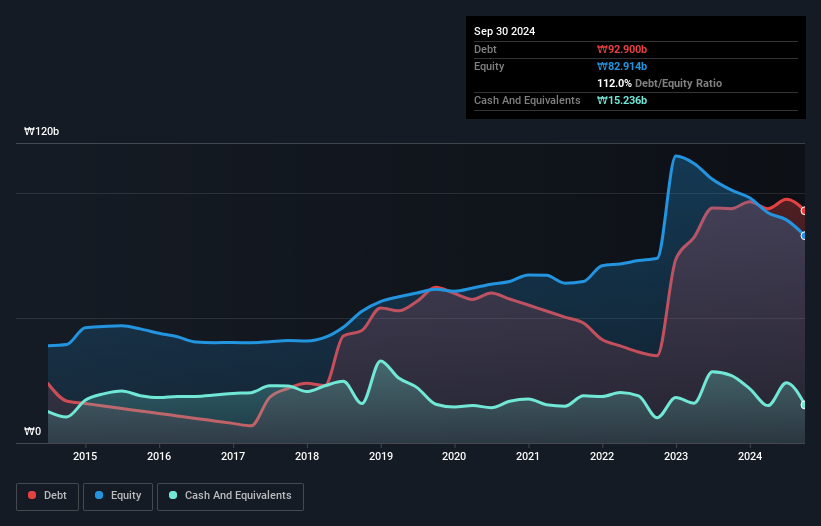Some say volatility, rather than debt, is the best way to think about risk as an investor, but Warren Buffett famously said that 'Volatility is far from synonymous with risk.' When we think about how risky a company is, we always like to look at its use of debt, since debt overload can lead to ruin. We note that APACT Co., Ltd. (KOSDAQ:200470) does have debt on its balance sheet. But the real question is whether this debt is making the company risky.
When Is Debt Dangerous?
Debt is a tool to help businesses grow, but if a business is incapable of paying off its lenders, then it exists at their mercy. In the worst case scenario, a company can go bankrupt if it cannot pay its creditors. However, a more frequent (but still costly) occurrence is where a company must issue shares at bargain-basement prices, permanently diluting shareholders, just to shore up its balance sheet. Of course, the upside of debt is that it often represents cheap capital, especially when it replaces dilution in a company with the ability to reinvest at high rates of return. When we think about a company's use of debt, we first look at cash and debt together.
View our latest analysis for APACT
How Much Debt Does APACT Carry?
As you can see below, APACT had ₩92.9b of debt, at September 2024, which is about the same as the year before. You can click the chart for greater detail. However, it does have ₩15.2b in cash offsetting this, leading to net debt of about ₩77.7b.

How Strong Is APACT's Balance Sheet?
According to the last reported balance sheet, APACT had liabilities of ₩80.9b due within 12 months, and liabilities of ₩23.4b due beyond 12 months. On the other hand, it had cash of ₩15.2b and ₩4.98b worth of receivables due within a year. So it has liabilities totalling ₩84.1b more than its cash and near-term receivables, combined.
This deficit is considerable relative to its market capitalization of ₩100.2b, so it does suggest shareholders should keep an eye on APACT's use of debt. This suggests shareholders would be heavily diluted if the company needed to shore up its balance sheet in a hurry. When analysing debt levels, the balance sheet is the obvious place to start. But you can't view debt in total isolation; since APACT will need earnings to service that debt. So if you're keen to discover more about its earnings, it might be worth checking out this graph of its long term earnings trend.
Over 12 months, APACT made a loss at the EBIT level, and saw its revenue drop to ₩82b, which is a fall of 26%. That makes us nervous, to say the least.
Caveat Emptor
Not only did APACT's revenue slip over the last twelve months, but it also produced negative earnings before interest and tax (EBIT). Indeed, it lost a very considerable ₩26b at the EBIT level. Considering that alongside the liabilities mentioned above does not give us much confidence that company should be using so much debt. So we think its balance sheet is a little strained, though not beyond repair. However, it doesn't help that it burned through ₩22b of cash over the last year. So suffice it to say we consider the stock very risky. When analysing debt levels, the balance sheet is the obvious place to start. However, not all investment risk resides within the balance sheet - far from it. Be aware that APACT is showing 3 warning signs in our investment analysis , and 2 of those don't sit too well with us...
If you're interested in investing in businesses that can grow profits without the burden of debt, then check out this free list of growing businesses that have net cash on the balance sheet.
New: Manage All Your Stock Portfolios in One Place
We've created the ultimate portfolio companion for stock investors, and it's free.
• Connect an unlimited number of Portfolios and see your total in one currency
• Be alerted to new Warning Signs or Risks via email or mobile
• Track the Fair Value of your stocks
Have feedback on this article? Concerned about the content? Get in touch with us directly. Alternatively, email editorial-team (at) simplywallst.com.
This article by Simply Wall St is general in nature. We provide commentary based on historical data and analyst forecasts only using an unbiased methodology and our articles are not intended to be financial advice. It does not constitute a recommendation to buy or sell any stock, and does not take account of your objectives, or your financial situation. We aim to bring you long-term focused analysis driven by fundamental data. Note that our analysis may not factor in the latest price-sensitive company announcements or qualitative material. Simply Wall St has no position in any stocks mentioned.
About KOSDAQ:A200470
APACT
Manufactures and sells semiconductor testing equipment in South Korea.
Mediocre balance sheet with very low risk.
Market Insights
Community Narratives



